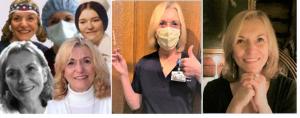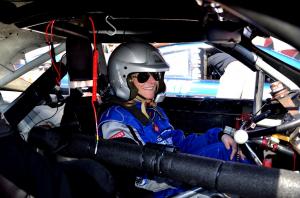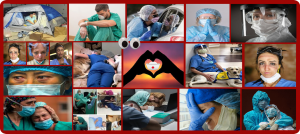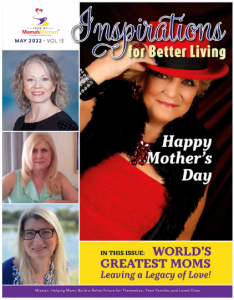THE DELAYED BUT NOT FORGOTTEN MOTHER'S DAY STORY: The Shaping of Compassion
Inspirations for Better Living digital magazine article celebrating Mother's Day 2022 - World's Greatest Moms - Leaving a Legacy of Love!
Compassion isn't something you can see, you feel it. If compassion were a person, it would most definitely be a nurse; quietly, confidently, and resolutely doing what is right, needed, and selfless.”
PACIFIC PALISADES, CALIFORNIA, UNITED STATES, May 9, 2022 /EINPresswire.com/ -- Ever wonder how our Mom inspires us to be the person we are today? Inspirations for Better Living digital magazine explores this question in their special Mother's Day edition with the theme World's Greatest Moms - Leaving a Legacy of Love! Launched in May 2021, the magazine focuses on the Mom herself. Their team of experts' contributors' (former guests of From My Mama's Kitchen® Talk Radio) share real-life stories to help moms navigate the motherhood journey as the COOs, if not the CEOs of their families.— Pamela Jane Nye
The magazine's publisher, Johnny Tan, believes mothers matter as a person, in heart, mind, body, and spirit! When Mom feels great, empowered, and happy, the ripple effect permeates her circle of influence - her family, neighborhood, and community. The magazine's mission is to help Moms build a better future for themselves, their families, and loved ones. While short on current magazines that focus only on the Moms, there are plenty that address the family unit's daily operational life. Inspirations for Better Living offers mothers a loving serving of inspiration to experience joy daily.
Tan is a multi-award-winning and bestselling author of "From My Mama's Kitchen: Food For The Soul Recipes For Living," a book honoring his 9 Moms, and certainly has firsthand knowledge about the power of unconditional Mother's Love! His 9 Moms were his teachers, coaches, and counselors, helping him navigate his life's journey by always looking through the Lens of Love! The magazine is beautifully organized into warm and inviting sections such as Kitchen Table Conversations, Hot Off The Stove, Mama's Family's Piggy Bank, and The Joy of Raising Twins, to new a few. The engaging, entertaining, and enlightening experiential stories truly touch the hearts and move the souls.
One such compelling and empowering magazine section is the Bubble of Quiet Confidence. Here is where readers get a nice serving of how women, especially mothers, overcame life challenges, lived in the moment, and, more importantly, expanded their comfort zone to succeed and thrive. These ladies are passionate about building a better world for others to benefit from and follow!
Tan picked this story to commemorate 2022 National Nurses Week, "The Shaping of Compassion/A Nurse's Story" by Pamela Jane Nye; MS, RN, CNS-BC, CNRN, SCRN, ENLS, Associate Professor UCLA School of Nursing/Nurse Practitioner Program, Presiden/CEO of Neuroscience Nursing, Ltd., Owner of Operation Scrubs, Inc. 501(c)3 nonprofit. Nye's also Creator and Executive Director of THE NURSES WALL mission - a public-involved virtual gift of appreciation honoring the world's 20+ million unsung hero nurses. The link to this magazine copy is https://neurosciencenursing.homestead.com/ImportedDocuments/FMMK_Inspirations_for_Better_Living_-_Vol_13_-_May_2022_-_Bubble_of_Queit_Confidence.pdf
"After years of trying, a beautiful baby girl was born to an inspiring couple. They named her Pamela, and five days later, they celebrated by bringing her home from the hospital on Thanksgiving Day; it was indeed a blessing for this seemingly infertile couple.
As she grew and her personality developed, by age three, it was clear she was a "helper," constantly lapping up the praise from her mother for picking up her toys, making her room tidy, and "assisting" in the kitchen. She was also a people-pleaser and soaked up positive energy looking for those valuable words of approval for her good deeds. Life was good.
By the age of four, it was noticeable that she had acquired a personality trait of empathy. She loved animals and shed tears over a dead animal's body in the street and said, "Do you think this squirrel was a Mama with babies?" She would often notice when another child was crying and offer to hold a hand or a hug to make things better. She loved to give gifts to the neighbors – usually shiny rocks she had found. She was an intelligent child and began reading long before going to school. At first, her mother thought she had memorized the words in books but dispelled those thoughts when she read aloud the words to which her mother would point.
Not surprisingly, the first day of school was a true celebration with pictures, new crayons, and pencils. Going to school was a delight for his little girl, and she was very obedient to her teachers. But, who would have known that her life would forever change within a few days of her idyllic school attendance?
That day came when her Uncle picked her up at school and took her back to the neighbor's house, saying, "You be a good girl and stay here for the afternoon." He gave no reason and didn't say how long she needed to stay there. Very odd, she thought while looking out the window and seeing so many police cars surrounding her home; she also saw familiar cars and family members arriving. What was happening? And why didn't they want her there?
What seemed like hours later, the little girl's Uncle returned, brought her across the street, and sat with her on the house's front steps. The strange goings-on became even more bizarre when her face-flushed and teary-eyed Uncle said, "I need to tell you something; your Daddy's not coming home anymore." What? What in the world was going on? Daddy always comes home in the afternoon. "Your Daddy is in heaven with God," he said.
Now it was beginning to make sense. Pamela had gone to Sunday school enough to know where God lived, and if her Daddy were with Him, he wouldn't be here anymore. He's with the angels, she believed. And all those police cars at her house were her Daddy's friends because he too was a policeman.
From that moment, my world changed. Yes, I am the little girl in this story, and this was the day I grew up and learned how grief and loss looked and felt. I also knew how abandonment felt and wondered what I had done to cause this pain. The days at the dinner table for the three of us were gone. Now it was just Mom and me, and she was so sad.
The days after my Dad's death would shape me as I wondered if I was the only kid who had experienced such hurt and loss. Now my job was to assure my mom that "everything is gonna be okay." And while I wasn't sure it would be, I learned that if you repeat something often enough, you tend to believe it, and oddly enough, things become okay.
My days were filled with making good grades so Mom would be proud, like reading, studying, and synchronized swimming. I learned how to cook by age ten, and after that, my job was to prepare dinner for my exhausted mother, who worked all day to keep our home together.
I learned from my Mother the value of hard work, persistence, responsibility, and the Iowa work ethic. I learned that an honest day's work deserved an honest day's pay and reliability. I prided myself in keeping my word. I was being taught values and didn't know it. I babysat the neighbor kids to earn money for new fall school clothes and got my first "real" job at age 16 in a hospital kitchen making patient meal trays in the hospital's basement. Not glamorous, but profitable in the eyes of a sixteen-year-old.
And here I met nurses. My job was to bring the meal trays to the hospital wards for the nurses to serve. They were dressed in white from head to toe, pressed and clean; even their legs were white! They were kind to me, and I loved it. They were only missing wings to be mistaken for angels. They laughed with one another and seemed very happy with their work. I was mesmerized!
Fast forward through high school, marriage, a baby, and college. I continued to work to put my husband through college, and then, you guessed it, I applied to nursing school. In those days, married women with children weren't considered nursing student material, and the Director of Nursing made this very clear. But, she said, I'll make an exception, and if I did well ... there would be others to follow me. Wow! She was letting me in!
From this point forward, I learned what multi-tasking meant. Above all, I was a Mom to a rambunctious 4-year-old who proudly taught sex education to the neighbor kids saying, "my mom's a nurse, and she knows these things," and prompted heart-to-heart talks about appropriate neighborhood discussions.
Through the years, I've often wondered, is compassion learned? Or is it found in your DNA? As I began practicing my new nursing trade, it felt very natural. I never had to be taught to care. I never had to be taught how it feels to walk in the shoes of another. No one ever taught me how to "feel" for another; I just seemed to know these things deeply in my being. Compassion was always part of my authentic self; it wasn't feigned or artificial. I was often told, "you're such a good nurse," and wondered exactly what that meant, thinking, was there another way of being a nurse?
Compassion isn't something you sometime's can't see, but you can feel it. And while it's intangible, you can sense its absence. Oh, most certainly, you can see compassion in someone's eyes and hear it in someone's voice. If compassion were a color, I believe it would be light blue, the color of the sky. If compassion were an aroma, it would be the clean scent of a freshly bathed newborn. If compassion were a sound, it would be the whispering of a breeze in the trees. And if compassion were a person, it would most definitely be a nurse, quietly, confidently, and resolutely doing what is right, needed, and selfless.
I've nursed for more than 30 years. I've plied my trade in hospitals, clinics, college classrooms, and neighborhoods. I'm also known as the neighborhood nurse, and people call me frequently for advice and resources. Of course, I always recommend they see their doctor. I can be helpful, however, until they can get that appointment. And as the neighborhood nurse, I can recall one recent example of compassion.
I had met a young woman who lived nearby while I was walking my dog. Melissa was her name, and upon a brief chat, when she learned I was a nurse, her face changed to sadness, and she said, "I'm so worried; I just found out I have a brain tumor." She and her partner were newly married, and I assured them I would stay in their lives to see them through the rough spots of her brain surgery recovery. Who would have guessed after three months, I would be helping them set up a hospice in their home? Then began the daily visits until Melissa could no longer care for her personal needs like bathing and toileting.
Soon it was apparent that her death was imminent; she was unconscious and bedfast. All her friends gathered and occupied the chairs throughout the dining and living rooms. It was a vigil. And the night I asked for soap and towels to give her a bath, the response was, "What? A bath?"
It was the very least I could do to provide a bit of comfort. So, I gently washed Melissa's body and brushed her hair, talking to her all the while. "You are so loved, Melissa," I said. And with familiar words of reassurance, I said, "All your friends are here; everything is going to be okay," She was quiet and serene – and shortly after her bath, she silently passed away. Melissa's partner, Belinda, softly held her hand and wept. The hours of waiting were over, and Melissa's suffering had ended.
Somehow, all the years of celebrating the happy moments with my patients, worrying over the many unknowns of illness and injury, and feeling heart-wrenching moments during the sad times have made me the compassionate person I am today. It's who I am at my core; I don't think it can be separated from me.
Chuck Foster
WCNi News Service
8002676156 ext.
chuckfoster@wcninewsservice.com
Why, Who and How it Works!





